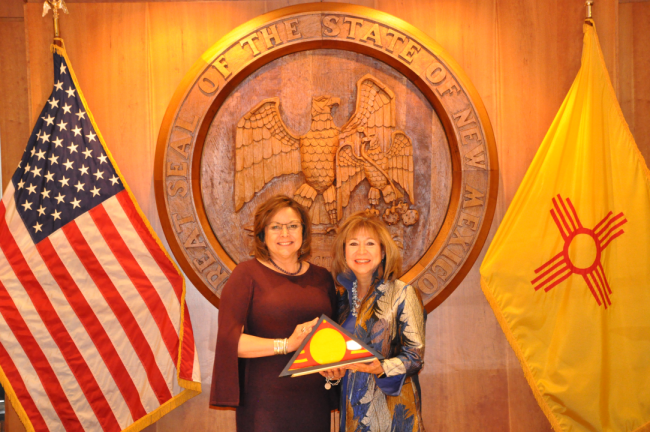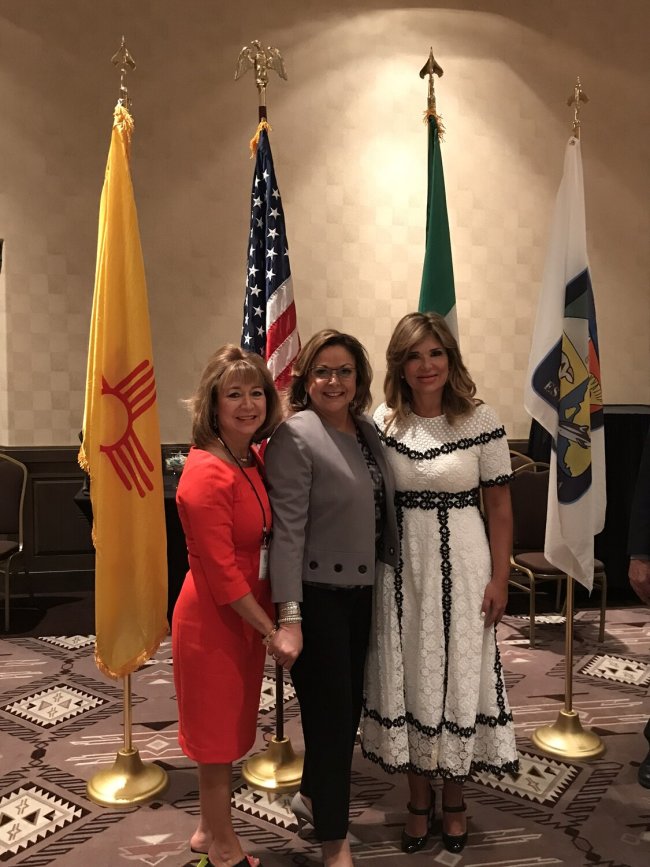The Unstoppable Barbara Incardona Damron: How the RWJF Health Policy Fellows Program Helped Her Become an Education Policy Champion

Barbara Damron (left) with former Governor of New Mexico Susana Martinez. Photo courtesy Barbara Damron
By Marisa Coulton
Barbara Incardona Damron is unstoppable. For decades, the University of New Mexico professor has made waves in the health policy world at the municipal, state, and federal level.
Through the Robert Wood Johnson Foundation (RWJF) Health Policy Fellows program and the force of her own will, Damron has been able to fly higher than she ever dreamed possible.
Damron came from humble means. Her parents, who both completed their education at the grade-school level, became respected pillars of their community in New Orleans, Louisiana.
Damron’s parents would often volunteer in hurricane-affected areas. “Every time there was a hurricane, we went to wherever that hurricane was, and we helped all the people there,” said Damron. “We’d bring food, diapers, whatever was needed.”
Over time, she developed a passion for giving back. When it came time for her to choose a career, nursing seemed like a great fit.
“I fell in love with the patients,” Damron said. “I could really see the difference I could make in their lives. It just felt comfortable and natural for me.”
But it wasn’t all rosy. Occasionally, Damron would witness conduct on the hospital ward that she didn’t agree with. For example, doctors would sometimes withhold a patient’s diagnosis on the basis that the patient lacked the education to understand what was happening.
“It wasn’t fair,” Damron said. “That’s when my interest in policy and advocacy began.”
But back then, a doctor’s word was law, and Damron had little say in the matter. “Later on in my career, I learned to start asserting and advocating, saying, ‘No, the patient has a right to know this.’”
‘You’ve got to go do this RWJF fellowship’
Damron was a powerhouse; she quickly rose through the ranks to become the head of the third-floor plastic surgery unit at Fort Worth Children’s Hospital where she single-handedly transitioned the entire floor to a full-fledged oncology unit at just 22 years old.
By now, Damron’s expertise was widely known. She was recruited to help open a new hospital—Huguley Memorial Hospital in Burleson, Texas—where she hired and trained all the medical-surgical nurses.
She didn’t stop there: she got her Master of Science in Nursing from The University of Texas Health Science Center at San Antonio, opened up her own private nursing practice, and became the first advanced practice oncology nurse in South Texas.
At the same time, Damron was becoming more deeply involved in policy. She became president of the Texas/Hawaii Division of the American Cancer Society and organized ‘lobby days’ at the State Capitol, during which she and other members of the organization would meet with state legislators. She was also involved in advocacy days in Washington, D.C., meeting with U.S. Senators and U.S. Representatives.
The Lieutenant Governor of Texas took notice of Damron’s policy acumen and appointed her to serve on the Texas Cancer Council, a task force aimed at reducing cancer rates in the state. She developed the Council’s nurse oncology education program and assisted in the development of the physician oncology education program.
“We did amazing work, I have to say, in the state,” she said. “We went to every nursing school and medical school in the whole state to impress upon them the importance of teaching cancer throughout the curriculum.”

amron with members of the 2012-2013 class of RWJF Fellows. Photo courtesy Barbara Damron
She decided to get her doctorate in the psychology of oncology at the University of Texas at Austin. By this point, she had accumulated enough knowledge to found her own consulting practice, in which she helped people set up bone marrow transplant centers and oncology units.
Damron was then recruited to the University of New Mexico Cancer Center. That’s when she heard about the RWJF Health Policy Fellows program. “People were saying, ‘You’ve got to go do this RWJF fellowship.’ I didn’t even know about it,” she said.
The more she learned about it, the more interested she became.
‘A mini master’s degree’
What appealed most to Damron about the fellowship was the opportunity to learn about policymaking at the federal level. “I understood how laws and such really came to be at both state levels, but I was really curious about all the public policy at the federal level,” she said.
She applied and was accepted to join the 2012-2013 cohort.
The program began with an orientation from September to December, during which Damron and the other fellows had the opportunity to have deep, candid conversations with health policy leaders and organizations.
Orientation was intense, informative, and fulfilling, Damron said. A sort of “mini master’s degree.”
After the orientation, the fellows attended a series of group meetings where they explored possible placements. Finally, the fellows had one-on-one interviews with the offices they were most interested in, which included placements in the House of Representatives or the Senate, or in the Executive Branch.
Damron completed a placement on the Senate Health, Education, Labor and Pensions (HELP) Committee (Minority). The placement exceeded her expectations, she said. “It was what I hoped and more.”
Damron had the opportunity to work on two major bills that ultimately passed. One had to do with compounding pharmacies, which, at the time, were not regulated. Drawing on her years of experience as a nurse, Damron advocated to change the language in the bill from “physician” to “advanced practice provider” to enable nurse practitioners to prescribe compounding pharmacy pharmaceuticals.
“My language got into that bill,” she said with pride. Had she not been there, she said, that development may have taken years to come to fruition.
‘Owning’ what you know
Before long, the knowledge and skills Damron had gained during the fellowship began to have a positive impact on her career.
Shortly after the program concluded, Damron was approached by then-Governor of New Mexico, Susana Martinez. Martinez wanted to interview Damron for a big job: trustee on the governing board of the University of New Mexico (UNM), where Damron had been working as a professor.
In the interview, Damron answered the Governor’s questions with confidence, a skill she had honed during the RWJF health policy fellowship. “The fellowship really taught me how to own what you know,” Damron said.
Thanks to her experience on the HELP committee, Damron was quite well-versed in education policy; prior to the program, she had only had a passing knowledge of the subject. During her placement, she had the opportunity to work with the education policy team, where she learned all about the different challenges that the state K-12 systems faced in preparing students for college.
By the end of the conversation, Martinez was so impressed by Damron’s knowledge that she felt Damron would be better suited to an even bigger role. “I don’t want you to be a [trustee],” Martinez said. “I want you to be in charge of all the [trustees].” Damron knew more about higher education than anyone Martinez had ever spoken to, she told Damron.

Damron with former Governor of New Mexico Susana Martinez and former Governor of Sonora, Mexico, Claudia Pavlovich Arellano. Photo courtesy Barbara Damron
She appointed Damron the Cabinet Secretary of Higher Education for the State of New Mexico. “Those whole four years I was secretary, I [drew] on what I learned in the fellowship,” Damron said. “It just made a world of difference.” She had a successful term—she was the longest-serving higher education secretary and accomplished a great deal.
At the time, graduation rates from colleges were low. Damron helped pass a bill to help universities and colleges retain more students, an accomplishment she owes to the RWJF Health Policy Fellows program. “That was a very clear demonstration of what I learned in the fellowship,” she said. “You build your coalition, you build your supporters, you build your relationships, you’re clear with your goals, you make them attainable and get legislation to back them up.”
She also implemented a common course numbering system for all the public universities and colleges in New Mexico, drawing on her experience in the fellowship. “Through the fellowship I learned when is the right time to make something a statute, propose a bill, and when is not, and then again, how to get sponsors for that bill, and how you get buy-in from the two different parties, and the two different branches of government…,” Damron said. “Those nuances I would not have known without going through the fellowship.”
Damron continued to climb, becoming the first person to serve as the Chief Government Relations Officer for the entire UNM system. In this role, she oversaw all federal, state, tribal, county and municipal government affairs for the system, reporting directly to the UNM president.
During her tenure, she was able to call on D.C. contacts she had made during the fellowship, which enabled her to do the job “creatively, efficiently, and competently,” she said. “Working on the Hill gave me entrée into many different areas.”
“I could not have done the job without my [RWJF] fellowship,” said Damron. “I knew, more than anybody else, how bills worked, how earmarks worked, how elections worked, how to lobby. All those things I learned through the fellowship.”
She recently secured $900,000 toward an education research project called Project Echo, which is geared at ‘democratizing knowledge.’ If not for the fellowship, she never would have segued into the education sector. “The fellowship opens doors that we would not expect in areas adjacent to health,” she said.
Damron advises individuals considering the RWJF Health Policy Fellows program to take the leap and apply. “It’s worth it,” she said. “There’s nothing else like it. It’s just a priceless experience you cannot get anywhere else.”
Be unstoppable. The application period for the 2025-2026 class of RWJF Health Policy Fellows is open August 1-November 5, 2024. Learn more at HealthPolicyFellows.org
Follow the RWJF Health Policy Fellows program on LinkedIn or email info@healthpolicyfellows.org to get in touch.
About the Author: Marisa Coulton is a journalist based in Toronto, Canada. She holds a Master of Journalism and a Master of International Affairs from Columbia University.
